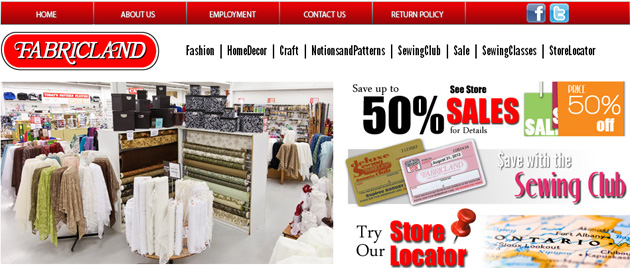
Every now and then, Louise likes to go to a place called
Fabricland. It’s not a sovereign nation, it isn’t a country made entirely of
fabric and to my knowledge it isn’t a magical land where gnomes, fairies and
other magical folk live. It is just a store that has thousands of different
kinds of material and pretty much anything a person would need if they were to
do any sewing.
Curiously enough, the one thing they don’t sell is sewing
machines. I guess that sewing machines need a different kind of place and sales
people with a specialized knowledge.
I will usually go with Louise and once inside I go my
separate way. She is looking for fabric and I am generally looking for anything
that catches my eye. They have all sorts of specialized tools, cutting boards,
scissors, buttons, patches, thread and all sorts of colourful items that just
cry out to be touched. I like to know what kind of things a store carries just
in case I am ever asked by someone where they might find buttons shaped like a
butterfly, or a curved ruler that has grid lines.
Did I mention pins? There are pins and needles galore, all
different sizes, shapes, colours and of course uses. I was speculating what use
a particular pin would have when I saw this free pamphlet on choosing the right
pin for your purpose. Just the thing I needed at the moment and as it turns out
just the thing I need for this blog.
I learned that there are at least 26 different kinds of pins
and all of them have a special purpose. I think that they could do with fewer
different kinds and just make do with what was left, but that’s just me. There
are pins for delicate fabric, pins for heavy fabric, and pins for quilting, for
sequins, lace, knits and for beading. There are pins with one prong, two prongs
and prongs that are twisted. They sell a variety of safety pins, some of which
I have seen before and others that I haven’t. I remember the diaper pin, but
there isn’t much use for it these days, and I notice there is a blanket pin. I
wonder why you would need a pin for a blanket.
Pins have a head, a shaft and a point. They can be short,
medium or long and they can be made form nickel plated steel, stainless steel,
brass and nickel plated brass. You can buy special pin boxes, a tomato pin
cushion (I remember that mom had one of those), a magnetic pin holder and a pin
wand to pick up fallen pins. Okay, that last one is just a plastic covered
magnet.
I don’t know why I even care, and I am sure that you could
care even less than I do. It’s just nice to know that there are people out
there that spend their waking hours making sure that we have pins for all
occasions. Strange way to make a living.



No comments:
Post a Comment